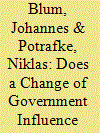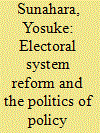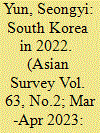| Srl | Item |
| 1 |
ID:
175311


|
|
|
|
|
| Summary/Abstract |
We examine whether changes of government influence compliance with international agreements. We investigate compliance with the NATO two percent target to which all NATO countries committed themselves during the NATO summit in Wales in 2014. The dataset includes the military expenditure by NATO countries over the period 2010–2018. The results suggest that countries that do not (yet) comply with the two percent target have smaller growth rates in military expenditure relative to GDP when they experienced a large change of government, e.g. a change from a rightwing to a leftwing government, than countries that did not experience such a large change of government since the NATO summit in 2014. Countries that experienced a large change of government are, thus, less likely to comply with the two percent target. Future research should examine the credibility problem of national governments in other international agreements too.
|
|
|
|
|
|
|
|
|
|
|
|
|
|
|
|
| 2 |
ID:
192848


|
|
|
|
|
| Summary/Abstract |
As women’s participation in the workforce expands, many countries seek to reform child care support by changing the gender division of labor. Japan also attempted universalistic child care support reforms, though these were not always successful. The electoral reforms of the 1990s prompted the major political parties to make universalistic reforms, and the major party leaders advocated similar ideas. Still, they failed to extend benefits to all children. Agreement on the expansion of funding was particularly challenging. By analyzing coalition formation within and among political parties, I show that the electoral reform led to stiff competition, which made it difficult for parties to agree. The change to a majoritarian electoral system not only intensified inter-party rivalry but also made it difficult to persuade intra-party groups that perceived a threat to their electoral success.
|
|
|
|
|
|
|
|
|
|
|
|
|
|
|
|
| 3 |
ID:
145443


|
|
|
|
|
| Summary/Abstract |
In 2015 Papua New Guinea marked its fortieth year of independence. But while the predictions of more pessimistic commentators in 1975 have been avoided, for many Papua New Guineans celebrations were muted; despite the country’s rich resource developments, for many people there has been little change in social and economic circumstances.
|
|
|
|
|
|
|
|
|
|
|
|
|
|
|
|
| 4 |
ID:
190032


|
|
|
|
|
| Summary/Abstract |
At the presidential and local levels, progressives were replaced by conservatives in 2022. But the National Assembly is still dominated by the opposition Democratic Party, so the government is more divided than ever. As a conservative government came into power in South Korea, North Korea fired the most missiles ever, and inter-Korean relations were very strained. The economy is in serious condition due to inflation, interest rate hikes, and slowing growth.
|
|
|
|
|
|
|
|
|
|
|
|
|
|
|
|